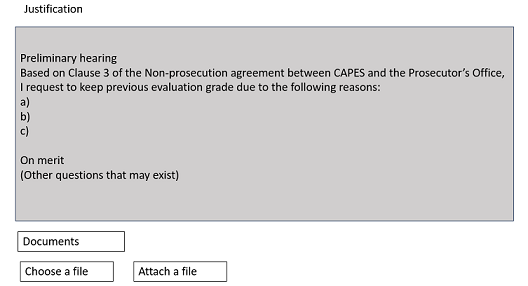Non-prosecution agreement – (NPA)
The Non-Prosecution Agreement approved in court addressed all matters brought by the public civil suit, allowing not only the full reestablishment of the institutional routine of the Quadrennial Evaluation, but also the consolidation, among others, of the following understandings:
- All provisions presuppose the preservation of Capes' competence to define parameters of the evaluation processes, regularly carried through its boards in cooperation with Universities and Education and Research Centers, represented by the area coordinations and scientific committees.
- It was established the adoption of standardized concepts for the parameters of the evaluation process, guaranteeing equal procedures in all situations. It should be highlighted that these concepts had already been carried on by the various area coordinations, as presented before the Scientific and Technical Council for Higher Education (CTC-ES).
- The rules established by the agreement keep untouched the comparative character of the Quadrennial Evaluation and do not impose the necessity of prior definition of cut-off factors or other purely comparative elements which, by their nature, can only be known after applying the pre-established parameters of evaluation.
- When considering that the Law prohibits the retroactive incidence of eventual innovations in the parameters of evaluation, and considering that a time frame for their publication has been set, always prior to the beginning of the four-year period of evaluation, Graduate Programs (PPGs) have better condition to known, in advance, the requirements to be presented at the end of the 4-year period, allowing predictability and equality to the Quadrennial Evaluation.
When did this discussion start?
- It started on December 8th, 2018, through Inquiry nº 1.30.001,005132/2018-61 (Prosecutor’s Office in Rio de Janeiro – MPF/RJ – Acronym in Portuguese)
- The whole discussion lasted around four years, considering both the public civil suit and the final agreement.
What did the Prosecutor’s Office inquire?
1. Subjective or undefined evaluation parameters could be misleading and ambiguous for the programs leading to inequality in evaluations;
2. Parameters defined at the end of the 4-year period, cannot be used for the current evaluation, which means that they will not have retroactive effects, under penalty of violating the principle of legal certainty and the predictability of the evaluation.
What did the Prosecutor’s Office require with the Public Civil Suit?
- In the ongoing evaluation (2017-2020) only the criteria established until the end of 2016 could be applied, without any type of alterations with the exception of transition regulations.
- To refrain, in future evaluations, from applying retroactive criteria, meaning those defined after March of the first year of the quadrennial period. New criteria are to be applied only in future quadrennial periods

What was the object of the agreement?
Capes committed to:
- Define evaluation parameters – retroactive effect is not allowed i.e., define them before the beginning of the evaluation period
- Establish standardized requirements to prevent evaluation parameters from causing non-equal evaluation.
The Prosecutor’s office recognized the necessity to apply the current parameters for the Quadrennial evaluation (2017-2020), even though they were only published at the end of this period, as long as Programs affected by possible retroactive innovations can request, as a preliminary to an appeal or request for reconsideration, that this aspect evaluated, allowing, in such cases, the reproduction of the previous grades.
What are the requirements established by the preliminary hearing?
All the following requirements must be taken in consideration:
- When assigning grades to a program, the area of evaluation /CTC-ES applied a retroactive parameter (i.e. establish a parameter and use it to evaluate data prior to it)
- The parameter responsible for the grade reduction must represent an innovation in relation to previous evaluations, and ca not consist of a parameter:
- Provided by Law;
- Already existing in the 2013/2016 Quadrennial; or
- Already established at the beginning of the 2017-2020 evaluation period.
- The application of this parameter must have been decisive for the decrease in the Program’s grade in relation to the previous period (2013-2016).


(Portuguese only
| Publicação na web | Nome do documento |
| 20/09/2022 | Orientações para requerimento preliminar em pedido de reconsideração, formato PDF 12,5 mb |

